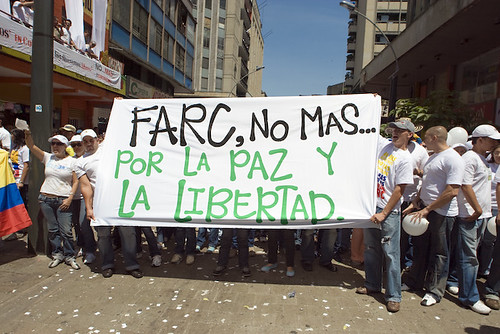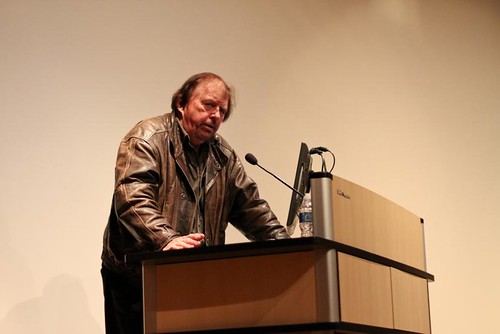RSS
Gwynne Dyer talks climate change
On Monday evening, International Affairs journalist, Gwynne Dyer, spoke to Concordia students about the effects of climate change.
He said that if the global temperature rises by two degrees, human kind is in big trouble. This could happen in just 20 to 25 years.
Dyer said that once we’re there, even if we turn off all of our emissions, there will be literally nothing we can do; there will be no turning back.
At the current rate, the earth is looking at an ice-free arctic by 2030.
That means sunlight will no longer be reflected by ice, but rather, it wll be absorbed by the water. According to Dyer, this will drastically reduce global food supply especially for countries close to the equator.
Mexico, for instance will not be able to feed their booming population, and may have to mass immigrate to the US. But, in this doomsday scenario outlined by Dyer, the US would close their borders completely. Across the world, wars would break out between countries that share rivers, and those upstream like here in Canada will try to hold their precious natural resources.
What has led to this crisis, according to Dyer? Burning fossil fuels for two hundred years.
But don’t panic, there is still a chance to save the planet, he said. We jest need to act fast.
Dyer finished with a warning, “If we had time, we could fix this without breaking a sweat, the issue is, we don’t have time.”
Steve McQueen's Shame Contest - Click Here

CJLO Radio is giving away double passes to the 7pm, Wednesday December 14th screening of Steve McQueen's Shame.
The critically acclaimed film stars Michael Fassbender (X-Men:First Class) as sex addict; Brandon Sullivan. His life is disrupted when his sister Sissy (played by Carey Mulligan) comes to stay with him unexpectedly.
Tweet @CJLO1690AM, post a comment to facebook or send an email to contest@cjlo.com with one thing you're ashamed of to be entered for your chance to win one double pass to the screening.
My Week with Marilyn Contest - Click Here

CJLO Radio is giving away dowble passes to the 7pm, Thursday December 15th screening of My Week with Marilyn.
My Week with Marilyn stars Michelle Williams as the sensational Marilyn Monroe, Kenneth Branagh as Sir Laurence Olivier and Eddie Redmayne as Colin Clark. The film features the story surronding Marilyn and Laurence Olivier as they filmed the movie The Prince and the Showgirl.
Tweet, post a comment to facebook or send an email to contest[at]cjlo[dot]com with the tag #CJLOMonroe to be entered for your chance to win one double pass to the screening.
News december 8 2011
Read by Katie McGroarty.
Produced by Sofia Gay.
Stories by Dominique Daoust, Sabrina Daniel and Shaun Malley.
One foot in the right direction
 Older vehicles will have mandatory emissions testing in Quebec.
Older vehicles will have mandatory emissions testing in Quebec.
Bill forty-eight was introduced at the national assembly by the Charest government on Wednesday. It’s part of the provincial measures to reduce greenhouse gas emissions and to improve air quality.
This legislation allows the government to require a vehicle to be tested before registration documents are issued. The testing will mainly affect cars that are eight years and older. Quebec’s automobile insurance board will refuse to issue registration plates if the car is too polluting.
Similar inspections are already mandatory in seven other Canadian provinces and forty American states. Greenhouse gases cause two thousand premature deaths annually according to the Canadian Medical Association.
Internationally renowned journalist Gwynne Dyer warns Concordia students about climate change
 On Monday evening, International Affairs journalist, Gwynne Dyer, spoke to Concordia students about the effects of climate change. He said that if the global temperature rises by two degrees, human kind is in big trouble. This could happen in just 20 to 25 years.
On Monday evening, International Affairs journalist, Gwynne Dyer, spoke to Concordia students about the effects of climate change. He said that if the global temperature rises by two degrees, human kind is in big trouble. This could happen in just 20 to 25 years.
Dyer said that once we’re there, even if we turn off all of our emissions, there will be literally nothing we can do; there will be no turning back. At the current rate, the earth is looking at an ice-free arctic by 2030.
That means sunlight will no longer be reflected by ice, but rather, it wll be absorbed by the water. According to Dyer, this will drastically reduce global food supply especially for countries close to the equator.
Mexico, for instance will not be able to feed their booming population, and may have to mass immigrate to the US. But, in this doomsday scenario outlined by Dyer, the US would close their borders completely. Across the world, wars would break out between countries that share rivers, and those upstream like here in Canada will try to hold their precious natural resources.
What has led to this crisis, according to Dyer? Burning fossil fuels for two hundred years. But don’t panic, there is still a chance to save the planet, he said. We jest need to act fast. Dyer finished with a warning, “If we had time, we could fix this without breaking a sweat, the issue is, we don’t have time.”
CJLO wants YOU to design our next t-shirt!

CJLO is looking for a new look to kick off our first annual funding drive in March 2012
The rules are simple:
1. Create a design that includes “CJLO 1690 AM” in it (it will be printed on an American Apparel Classic t-shirt).
2. Submit your t-shirt concept to contest@cjlo.com as a .psd file.
If your design is chosen, you will receive a deluxe CJLO prize pack as well as name publication on www.cjlo.com.
Happy designing!
Kelly "Sugarface Néné" Belfo
Name: Kelly Belfo
What is your DJ alias? & what are its origins? : Sugarface Nene (Nene means "Mommy" in the Ibo lauguage (Nigeria) and Sugarface was given to me by Raphael DJ 610 of Caribbean Callaloo)
Show: Beat The World
Genre: World
How long have you been at CJLO? : since 2003
What is the best thing about working at CJLO? : the music and the people
Describe your show as a potential life partner. What are its qualities? : I always looks forward to the time we spend together. It is supportive & reliable and I know where to find it (24/7).
Two reasons why you do your show?:
1) Creative expression
2) Discovering great music.
What do you think makes your show unique?: Beat The World is the only show on CJLO, even after 8 years, that travels all corners of the world. Furthermore, we travel deep into the roots and the rhythms of the music, namely with the drum. The drum is the essence if life. It runs through our viens!
If you weren't doing your show, in what other ways would you express yourself?: Play instruments, dance, and dj parties.
What was the biggest turning point in your musical journey?: I would constantly rewind the "mama say mama saa mama makossa" part in MJ's Starting Something when i was a pickney gal. I didnt realise it then but i was looping the sample. I wanted to hear it again and again. Secondly when i first discovered my dad's vinyl, I would play Led Zeppelin II, sit and listen to the trip.
Fill in the blanks
If I could travel back in time and bring back anyone, I would bring back my gedo (grandfather in Arabic). Because, he died when i was young so i never got to discover his talents. He painted and made instruments out of wood and metal. This way he could show me how to play them and teach me to make balawa the way no one else could.
Name your 2 favorite albums of all time: "The Miseducation of Lauryn Hill" Lauryn Hill & "Nevermind" Nirvana
What is the one piece of technology you cannot live without?: my stereo
Describe yourself in 3 words: passionate, traveler, courageous
Colombians protest against rebel violence
 Tens of thousands of Colombians took to the streets to protest against the Revolutionary Armed Forces of Colombia, or FARC, after they executed four captives.
Tens of thousands of Colombians took to the streets to protest against the Revolutionary Armed Forces of Colombia, or FARC, after they executed four captives.
The victims, military soldiers kidnapped more than a decade ago, were shot at point blank when government troops attacked the FARC hideout.
The FARC is a Marxists rebel group whose aim is to overthrow the government through violence. Since its creation in the 1960s, they have kidnapped and killed thousands of civilians and military officers.
Armed with modern weapons funded by their drug trafficking and extortion, the FARC poses a real threat to Colombians. But the people are sick of violence, and they are now demanding an end to the conflict.
December 7th, 2011
Read by Emily Brass
Produced by Nikita Smith
Stories by Chris Hanna, Emily Brass, Joel Ashak, and Sarah Moore




